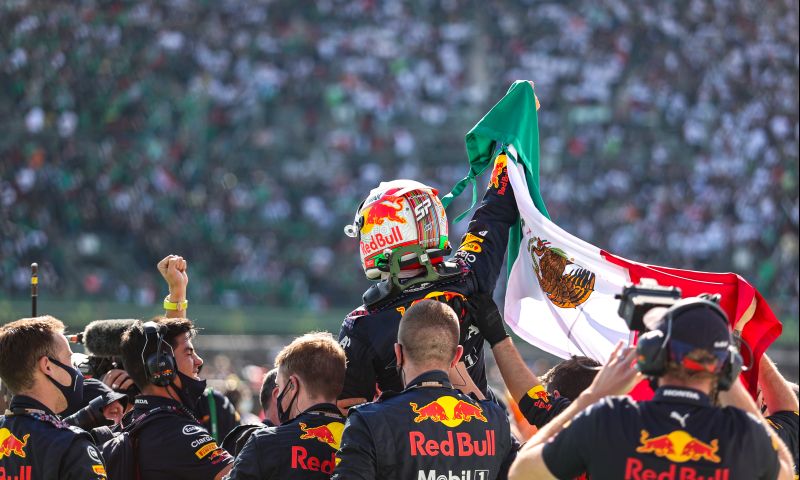Perez's karting school finds it "difficult to convince" families to race
Interview

- GPblog.com
During the Mexico Grand Prix weekend, GPblog interviewed Carolina Figueroa, a Mexican motorsport journalist. She told us how the Mexican perspective on Formula 1 has changed since the arrival of Seergio Pérez, how it has influenced the lives of Mexican society, especially after signing with Red Bull.
Carolina Figueroa is a Mexican sports journalist who dedicated body and soul to motorsport. She works for Racing Certified and during a pleasant chat, we discovered the ins and outs of how Formula 1 is experienced in Mexico and the passion of the Mexican fans after the consolidation of Sergio Pérez at Red Bull from the 2021 season.
Formula 1 in Mexico before Checo
As is the case in many countries with no previous motorsport culture, the fan base was not very big, as Figueroa reflects here: "Before Checo's arrival in Formula 1, the people who watched this category and motorsport in general were reduced to small groups of people who had been watching Formula 1 since the 80s or 90s. But she also tells us that small steps forward began to be made since the first appearance of the Mexican: "After Checo joined Sauber in 2011, there were people who started to echo Sergio's steps in Formula 1, in fact, he made them bring back the Mexican Grand Prix in 2015".
Mexican pride now that he's at the top of the category.
"Sincerely, it's a total pride for Mexicans and I include myself, as a Mexican myself. You could say that the Checo Pérez effect in Mexico since he has been at Red Bull has been similar to what happened with Fernando [Alonso] in Spain or what happens with Max [Verstappen] in the Netherlands. I would say that more than all that, what Checo does for the Mexican population is social work, it's an element that Mexicans can feel very proud of and that is very necessary for the country.
"In general, sport is very necessary to make society forget the problems of everyday life, the political instability, the criminality in the country, etc. And to a certain extent, sport is useful to make Mexicans proud. As outside the country the image of the Mexican with the little hat in the desert with the nopales is still present, the fact that a Mexican is performing at the top of a category such as Formula 1, is a total reason for national pride," Carolina said.
"The fervour that Checo creates in Mexico is indescribable. People go crazy for him, as we saw at last year's Mexican Grand Prix, after the race, the spectacle that was put on after the race, on the podium. The evening after the race, the ecstatic crowd filled the entire Avenida Reforma with Mexican flags and cheers for Checo, causing the whole avenue to be jammed. It was complete madness and look at the fact that he only came third," the journalist recalled.
Political gain for Checo's father
"Personally, I don't think it's right for his father to take advantage of his son's success to campaign politically. In that, Sergio is very clever, because he doesn't get involved in any of his father's political affairs. Although Red Bull also guides him so that he is not correlated with his father's political ideology and candidacy.
"In Mexico, people no longer trust politicians the old-fashioned way. That is why, lately, traditional political parties are turning to celebrities to gain the trust of Mexicans. In this case, Checo's father appealed to his son's pull in the country. But honestly, I think he needs to ally himself with someone or a miracle for his candidacy to have an effect, as it is very difficult to fight against the big sharks of politics," says Carolina.
Motorsport development in Mexico
Figueroa believes that on Checo's side the work is well done, but that there is a missing part that invests so that this can be carried out: "Checo already has his own karting school and his circuit, but there is no one else in the country that bets on this". However, in Checo's case, the one who helped put Mexico on the motor racing map was Carlos Slim, one of the richest businessmen in the world, owner of América Móvil, who took the risk and started to back Checo's sporting career from the beginning in karting: "Checo had immense difficulties to develop in the motor racing world, in a country with no motor racing culture, he had to make the effort to go to Europe to become something in the world".
The situation in Mexico, Figueroa tells us, is critical due to the lack of drivers: "Checo's arrival in Formula 1 was a miracle, and right now in Checo's karting school, which is linked to the Telmex team, two children of 5 and 6 years old are promising. And it is very difficult to convince a whole family with limited financial resources to go to Europe. That doesn't bode well for the near future when Checo retires," she said.

